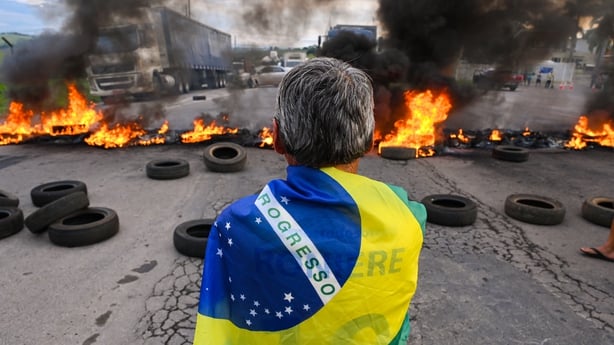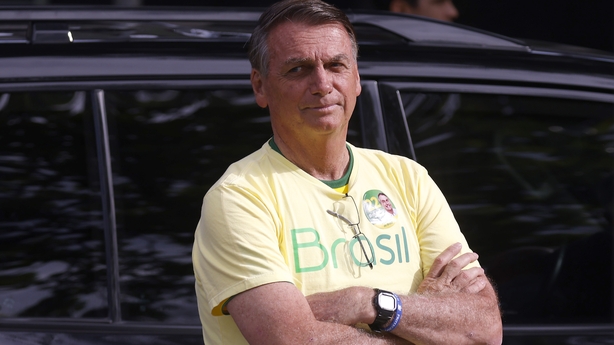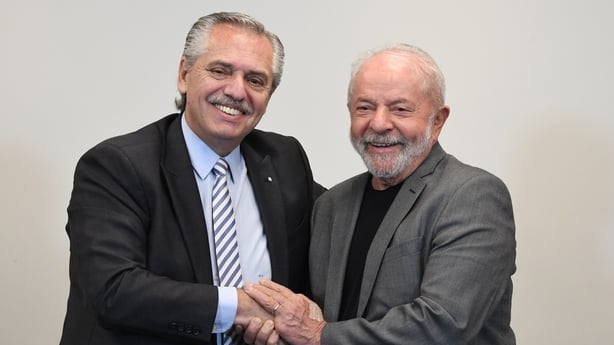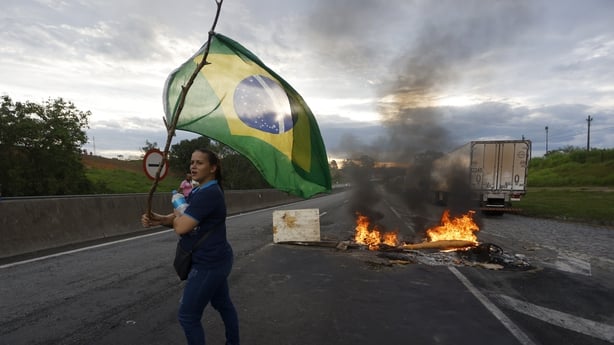Brazil's President Jair Bolsonaro has avoided conceding defeat in his first public remarks since losing Sunday's election, saying protests since then were the fruit of "indignation and a sense of injustice" over the vote.
His chief of staff, Ciro Nogueira, speaking after Mr Bolsonaro's brief public address, said the president had authorised him to begin the transition process with representatives of his rival Luiz Inacio Lula da Silva.
It took Mr Bolsonaro more than 44 hours to make his first public remarks since the election was decided by electoral authorities, making him the first Brazilian president to lose a re-election bid. He has still not spoken with Lula.
Amid his silence, supporters blocked highways to protest his defeat, with some calling for a military coup to stop former president Lula from returning to power. Mr Bolsonaro's delay in recognising Lula's election raised fear that he would contest the narrow result of the election.
In a national address today that lasted just a few minutes, Mr Bolsonaro thanked Brazilians who voted for him and reiterated that he would follow the country's constitution, which stipulates a transition of power on 1 January.
He referred to the demonstrations as a "popular movement" and said they should avoid destroying property or "impeding the right to come and go".

That may not be enough to defuse the protests across Brazil by small groups of his supporters, which have begun to cause economic disruptions.
Close political allies, including his chief of staff and Vice President Hamilton Mourao, have begun to make contact with the Lula camp to discuss a transition. Others, including the speaker of the lower house of Congress, called on the Bolsonaro government to respect the election result.
The powerful agricultural lobby CNA, representing farmers who were important campaign donors for Mr Bolsonaro, said it was ready for conversations with the incoming government.
Before Sunday's vote, Mr Bolsonaro repeatedly made baseless claims the electoral system was open to fraud and accused electoral authorities of favoring his adversary.
Mr Lula's victory represents a stunning comeback for the 77-year-old former metalworker, who spent 19 months in jail for corruption convictions before they were annulled last year.
He has vowed to overturn many of Mr Bolsonaro's policies, including pro-gun measures and weak protection of the Amazon rainforest.
We need your consent to load this rte-player contentWe use rte-player to manage extra content that can set cookies on your device and collect data about your activity. Please review their details and accept them to load the content.Manage Preferences
Protests across Brazil
Federal Highway Police (PRF) today reported more than 250 total or partial road blockages in at least 23 states by Bolsonaro supporters, while local media said protests outside the country's main international airport in Sao Paulo delayed passengers and led to several flights being cancelled.
Protesters wearing the yellow and green of the Brazilian flag - which the outgoing president has adopted as his own - said they would not accept the outcome of the election.
"We will not accept losing what we have gained, we want what is written on our flag, 'order and progress'. We will not accept the situation as it is," Antoniel Almeida, 45, said at a protest in Barra Mansa, Rio de Janeiro.
Last night Judge Alexander de Moraes of the Supreme Court ordered police to disperse the blockades immediately. He was acting in response to a request by a transport federation that complained it was losing business.

Lula gets to work
The mounting tension follows a dirty and divisive election campaign between the hardline conservative Bolsonaro and his nemesis Lula, who returns to office in a dramatic comeback.
Brazil's president between 2003 and 2010, Mr Lula crashed into disgrace in a corruption scandal that landed him in jail before his conviction was thrown out due to bias from the lead judge. However, he was not exonerated.
The election outcome showed just how polarised the country is between the two very different leaders.
Mr Lula scored 50.9% to Bolsonaro's 49.1% - the narrowest margin in Brazil's modern history.

With a massive to-do list, Mr Lula leaped into action, meeting Argentine President Alberto Fernandez in Sao Paulo and holding a series of phone calls with US President Joe Biden, France's Emmanuel Macron, Germany's Olaf Scholz, UN Secretary-General Antonio Guterres and others.
However Mr Bolsonaro's silence after months of alleging fraud in the electoral system and a conspiracy against him had the country on a knife-edge.
"Anyplace else in the world, the defeated president would have called me to recognize his defeat," Mr Lula said in his victory speech to a euphoric sea of red-clad supporters in Sao Paulo on Sunday night.
There are fears Mr Bolsonaro, 67, could attempt a Brazilian version of the US Capitol riots which rocked that country after his political role model, former US president Donald Trump, refused to accept his election defeat in 2020.
But the Brazilian leader may find himself isolated.
Some key Bolsonaro allies have publicly recognised his loss, including the powerful speaker of the lower house of Congress, Arthur Lira.
And international congratulations for Mr Lula poured in from the US, China, India, France, Britain, South Africa and numerous others.

Immense challenges
Mr Lula acknowledged the "immense" challenges facing his government when he is sworn in on 1 January, citing a hunger crisis, the economy, bitter political division, and deforestation in the Amazon.
He is likely to face a hostile Congress packed with allies of Mr Bolsonaro.
"Lula will have to show a lot of political skill to pacify the country," said political scientist Leandro Consentino of Insper university in Sao Paulo.
Mr Bolsonaro became the first incumbent president in Brazil not to win re-election in the post-dictatorship era after a four-year term in which he came under fire for his disastrous handling of the Covid-19 pandemic, which left more than 680,000 dead in Brazil.
He also drew criticism for his vitriolic comments, polarising style and attacks on democratic institutions and foreign allies.
Mr Lula's victory has been hailed by environmentalists and governments hoping he will make halting Amazon destruction a key priority.
The European Union's leadership voiced hope Lula's win would lead to ratification of a trade deal with South American bloc Mercosur, long stalled over concerns about rampant deforestation under Bolsonaro.
Norway announced it would resume paying nearly $500 million in aid for protecting the world's biggest rainforest, which it halted in 2019.

